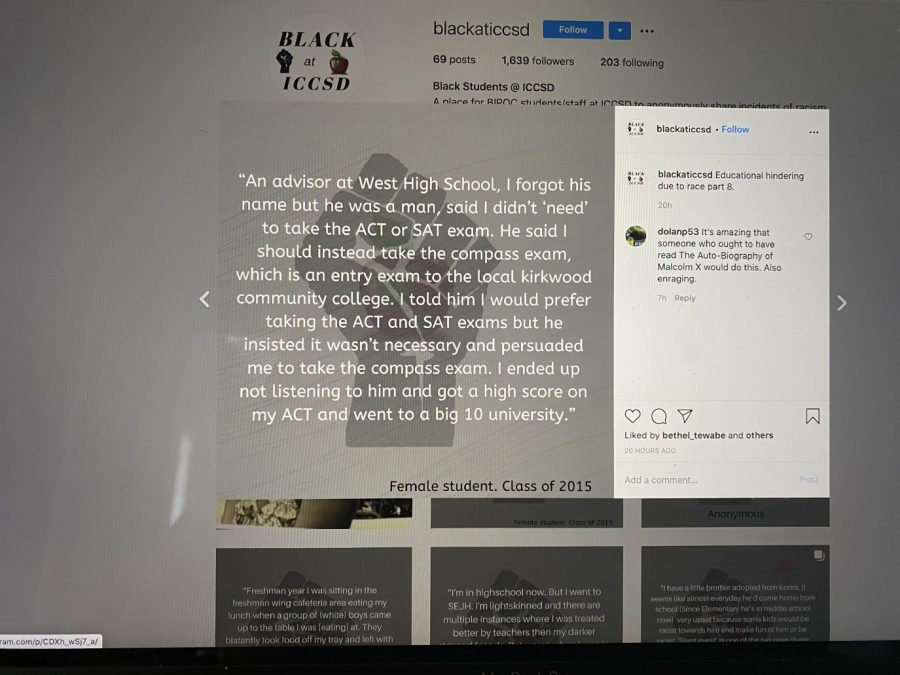Student-run instagram accounts post stories of racism, homophobia, sexual assault in Iowa City schools
Students in the Iowa City Community School District recently began publishing anonymous stories about discrimination and inappropriate behavior within the community.
A story posted on the @blackaticcsd Instagram page is seen on Sunday Aug. 2, 2020. The account posts stories from both students and alumni documenting their experience within the school district. The @blackaticcsd Instagram page also coincides with the @lgbtaticcsd Instagram page which shares the stories of LGBTQ+ students.
August 2, 2020
White teachers using the n-word. Heteronormative health classes. Male students sexualizing and harassing their female peers. These are a few of the stories students in the Iowa City Community School District have shared anonymously on community Instagram accounts.
Accounts like these have popped up over the past few weeks, encouraging students to share their stories with the hopes of raising awareness and creating a safe space. The administrators of the first account to do so, @blackaticcsd, initially posted July 19, establishing itself as “a safe place for BIPOC students to tell their stories and amplify their voices.”
The admin shared a link to a Google form where students could share their story and specify information they would like to use to identify themselves, if any.
Since first posting, the account has shared dozens of stories from Black, Asian, Latinx, and Jewish students, as well as white students who have witnessed racism. The posts are categorized in the caption, with labels such as “educational hindering due to race,” “feeling threatened,” “false accusations,” and “racist remarks,” which 22 of the posts are categorized as.
RELATED: Iowa Freedom Riders seek to share personal stories of racial injustice with Iowa City City Council
The @blackaticcsd account has also inspired other students to share stories from the district.
“I saw a lot of my classmates posting about the Black at ICCSD account and I saw their account and I thought it was a really good idea,” said Rachel Johnson, an incoming freshman at City High. “I just thought that there should also be a place for LGBT students to share their stories.”
Johnson reached out to some of her friends that are also in the LGBTQ community and two of them joined her in creating @lgbtaticcsd.
Since the account opened on July 22, Johnson and her friend have posted more than 100 stories from LGBTQ students across the district. The submissions identify a variety of discrimination and bullying students face. Two patterns in particular stood out to Johnson.
“One was just how many people talked about constantly hearing the f-slur and hearing ‘gay’ used as an insult,” Johnson said. “Just so many people talked about that and how it was just a normalized thing.”
Johnson said she also noticed the names of teachers that recurred in multiple stories.
Another account that followed the creation of @blackaticcsd was @girlsaticcsd. The account owner said in the account’s initial post on July 30 that it was a safe place to submit stories of sexism, misogyny, and harassment — and a majority of the posts have fallen into the latter category.
In the short time since their inception, the accounts have quickly gained a following. Black at ICCSD has more than 1,600 followers and the other two accounts have over 600.
The posts have also caught the attention of teachers and administrators.
“It just makes your heart hurt for students that have either experienced those things or witnessed those things in our school community,” Interim Superintendent Matt Degner said. “That’s definitely not what we want to be about, or the type of or the time of experience and climate we want to have for our students … As a human being and as an educator, I just feel bad and feel that we have a lot of work to do, and we have a lot of improvements to make so that students don’t have that experience in our schools.”
Degner said the district should incorporate ideas from the Comprehensive Diversity, Equity, and Inclusion Plan passed in December 2019 to address the problems highlighted by the accounts, with an emphasis on the plan’s third component to “create equitable, inclusive and supportive school environments.”
In addition to improving upon plans and policies already in place by the district, Degner said there are also other components it will bring forward as the district works through the school year in order to focus on improvement efforts.
He said he thinks the problem needs to be addressed on two fronts.
“How do we prevent those issues from ever occurring in the first place?” Degner said. “And second, when they do happen, what do we do to take action and report on those?”
The stories that stood out in particular to Laura Gray, director of Diversity and Cultural Responsiveness, were those that included teachers and administrators that behaved inappropriately, especially by using the n-word.
“That was surprising to me, in this day and time. I can recall back when I was in school … the PC thing was like, ‘If you’re doing it for academic purposes, if you’re reading from a novel, it’s okay,’” Gray said. “But I went to school in inner-city Chicago and our white teachers still didn’t say the word. They just knew not to. So I think it’s just a cultural thing too. I feel like when you’re around diversity more, you know better.”
She said if students already felt safe to speak up about their experiences, there wouldn’t be a need for this account. Gray said now that they have created their own platform, it’s time for the adults to listen.
“My hope is that this experience will teach all of us that our kids have something to say. We need to listen,” she said. “Your rationale behind what happened or didn’t happen or your thoughts about it are secondary to possible harm that was caused to our children.”




